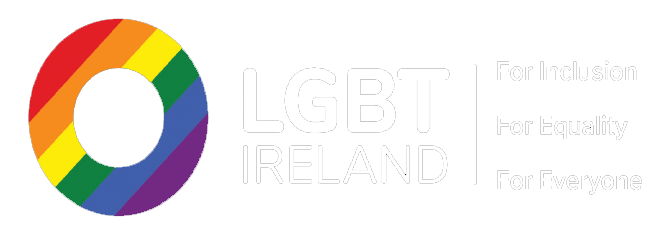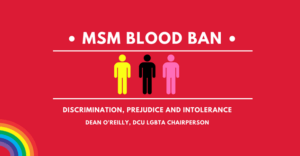“Without a doubt, the MSM Blood-Ban is one of few remaining, overtly prejudiced and undeniably homophobic public policies in Ireland.” Dean O’Reilly, Chairperson of the DCU LGBTA Society has penned a powerful piece regarding Ireland’s ban on blood donations from men who have sex with men (MSM). World AIDS Day, which takes place every year on December 1st, reminds us to reflect on the fear and misinformation around HIV and AIDS that leads to discrimination and stigmatisation in our society. Read more about it in Dean’s piece below.
A prolific marketing campaign of the Irish Blood Transfusion Service recently detailed the importance of blood donation in Ireland. All over the country we saw articles of families whose loved ones were saved following blood transfusions, social media posts detailing blood types, and various other promotional materials. Undeniably, the knock-on and direct effects of blood donation are extraordinary and cannot be forgotten. I would expect given this recent campaign that the IBTS have seen a reduction in blood donations; or at the very least they are struggling to meet demand. Many routine procedures in healthcare require a heavy supply of blood and their practice should not be impeded upon by shortages. As a general Irish Citizen, I am glad to see this prolific campaign and hope that it has motivated individuals to donate blood where possible. Furthermore, I am humbled by the various personal stories that have been shared. However, as a man-who-has-sex-with-men (MSM), I can’t help but look at this campaign under a different scope.
Current IBTS regulations prevent MSM from donating blood less they remain one-year abstinent. This comes as an update on the previous lifetime ban, lifted on January 16th 2017. As you can imagine, a campaign that highlights a process that which you have no access to can be quite alienating.
Picture yourself walking across O’Connell Bridge to see a large, skyscraper-covering banner that not only reminds you that you can’t donate blood, but you also can’t do so based on discriminatory policy. This is the situation that I found myself in a number of weeks ago. At first, it felt familiar. Seeing myself and persons like me fringed on society is a common occurrence; one need only look at the atrocities in Chechnya or homophobic rhetoric to gain insight. But, as time went on, there was something about the campaign that bothered me more than usual. You see, public discourse would contest that MSM can resolve the issue if they were truly dedicated. “If? ?you? ?really? ?wanted? ?to? ?donate? ?blood,? ?you? ?could.”
Reflecting on my feelings, ruminating, analysing, rationalising – all of the different -ings you could think of, I couldn’t pinpoint exactly why I was feeling this way about this particular campaign. In a sense, you’re right. There are ways MSM can donate blood if they feel compelled to. As a MSM, I could lie when asked about my sexual activity. I could withhold information on my strong tendency to sleep with other men. I could decide to stay abstinent for a year. I could never have sex again. But, as my thoughts progressed, I came to the very real conclusion: Why should I have? ?to do that?
The main arguments concerning the MSM blood-ban cite the risk of HIV proliferation and contamination of the public blood supply. Organisations state that there is a high probability for false-negative results when blood is tested and the potential transfer of the HIV virus outweighs all other arguments.
Firstly, I’d like to emphasise the absolute notion of heteronormativity in this policy. In those organisations that subscribe to this idea, inclusive of the IBTS, there is a complete neglect for the fact that many heterosexual men, women and non-binary individuals can all contract HIV, and can do so without any contact with MSM. Admittedly, there are higher occurrences of HIV transfer in queer populations. However, this is not a product of HIV itself and MSM, but instead a result of few provisions for these communities starting during the AIDS crisis of the ‘80s and continuing to today. In fact, there is strong debate in Ireland relative to the availability of PrEP – Pre-exposure Prophylaxis. While I find this topic deserves its own post to cover, I’d like to point out the hypocritical concern that the IBTS and Irish Government display as they wish to prevent HIV contraction in the general population, but refuse to provide access to MSM and other at-risk groups to those very medications that can curb HIV transfer.
Secondly, the research in support of the current position of the IBTS is not without critique. The UK recently lifted restrictions on MSM blood donations to an abstinence of three months, with many national organisations calling for a removal of the ban altogether (see: NUS “Bin the Blood Ban” campaign). I’d also like to note that this is a blanket ban, not only on those currently HIV+ (irrespective of viral load), but also on those without any record of HIV across their lifetime. To refer to recent research, the Centres for Disease Control and Prevention (CDC) announced in the last few days that those HIV+ and undetectable are incapable of passing the virus to another person.
Without a doubt, the MSM Blood-Ban is one of few remaining, overtly prejudiced and undeniably homophobic public policies in Ireland. With considerable questions concerning the volition of the ban, a demonstrated targeting of specific groups, a lack of desire to evolve with contemporary research and a complete lack of media coverage on the issue (despite exhaustive efforts by activists to have the ban removed), one cannot argue otherwise. As an MSM, I am saddened to see the entrails of mainstream homophobia and queerphobic policy continue to limit me in present-day Ireland. In the near future, I hope to see further coverage of this issue and a real commitment from organisations across Ireland in dismantling its restrictions. I hope to see Irish organisations take note from many campaigns across the UK and The United States and on a University level, I would love to see the NUS “Bin the Blood Ban” campaign extend to the Union of Students in Ireland.
The blood of MSM is not inherently harmful. We need to shift this narrative and start analysing the reasons why we allow fear and ignorance to rule IBTS policy. We deserve access, not barriers. We are not selfish, but willing. We are not a threat, but allies.

